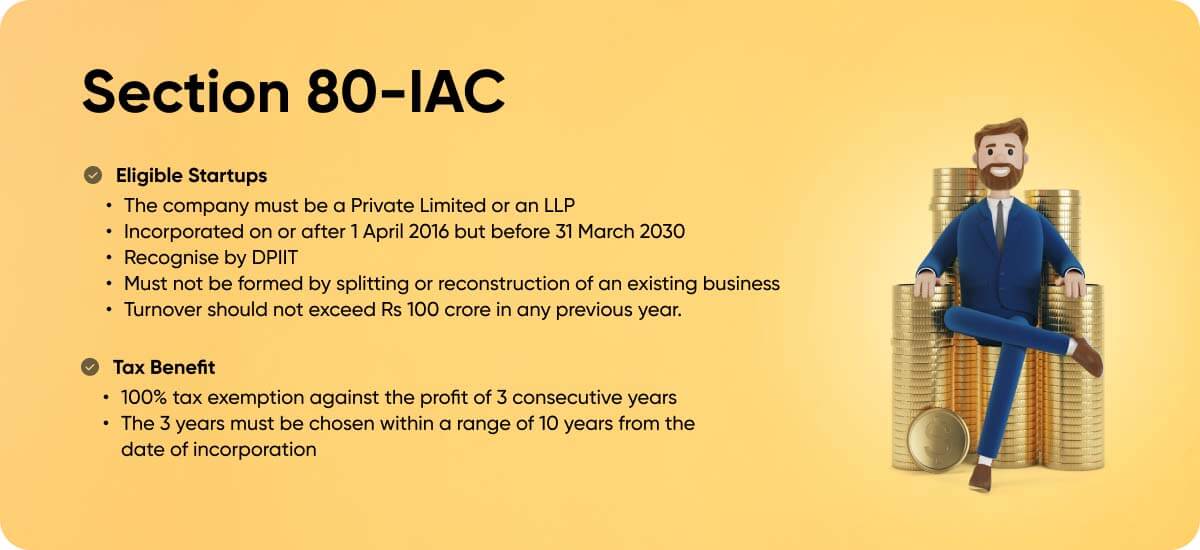Tax Exemption for Startup Under Section 80-IAC of the Income-tax Act,1961
Section 80-IAC of the Income Tax Act,1961, was introduced on 1 April 2017 to provide tax incentives to eligible startups in India. Under this section, recognised Indian startups can claim 100% tax exemption on profit for three consecutive years. This act applies to recognised Private Limited Companies and LLPs incorporated on or after 1 April 2016 but before 31 March 2030.
Eligible startups can claim tax exemption on profits and gains from any entitled business engaged in innovation, development, improved products or services, or a scalable business model with a high potential for employment generation or wealth creation.

What is Section 80-IAC?
- Section 80-IAC intends to facilitate the growth of startups during their initial phase by providing tax benefits.
- It came into effect to encourage innovation, use research and development, and foster a dynamic entrepreneurial system in India.
- It offers a tax incentive to domestic companies for endorsing investments in startups and other eligible businesses.
- It aims to reduce the evasion of taxes. Consequently, this tax benefit inspires young entrepreneurs to become genuine taxpayers.
Section 80-IAC Tax Exemption Eligibility Criteria
The following criteria must be satisfied to comply with Section 80-IAC of the Income-tax Act,1961.
- The assessee is a limited liability partnership (LLP) or a company involved in an eligible business (“eligible business” refers to a business conducted by an eligible start-up that innovates, develops, or enhances products/processes or services or adopts a scalable business model capable of substantial job creation or wealth generation).
- The particular company or LLP must be incorporated after March 31, 2016 and before 31 March 2030.
- The company’s or LLP’s annual business turnover doesn’t surpass Rs. 100 Crore in the year preceding the assessment year, for which deduction is claimed as per section 80-IAC.
- The startups should be acknowledged by the Ministry of Commerce and Industry, Department of Industrial Policy and Promotion (DIPP), and Government of India.
- The startup should possess a certificate of eligible business from the Inter-Ministerial Board of Certification as issued in the Official Gazette by the Indian Central Government.
- The company or LLP is not established by segregating or reforming a business that already exists.
- However, a re-established or reformed business can still avail deduction under section 80IAC if it is revived or re-established due to
- extensive damage or
- destruction by a natural calamity or
- other unforeseen circumstances(such as riot, civil disturbance, accidental fire or war) of any building, machinery, plant or furniture owned by the assessee and used for the purpose of such business.
- It is not established by the transfer of plant/machinery formerly used for any purpose to a new business. However, the old plant and machinery which has been already used in another business can be used in a business only if the old plant and machinery does not exceed 20% of the total value of machinery used in the existing business.
- According to the Income-tax Act,1961, to calculate deduction under Section 80-IAC, the gains and profits of the entitled business will be computed as if those businesses are the sole income source of the assessee during the previous years.
Benefits of Section 80-IAC
- The sum of the deduction provided under Section 80-IAC of the Income-tax Act,1961 equals 100% of the profits and gains acquired from the entitled business
- Deduction can be claimed for three sequential assessment years out of the first 10 years of operation.
- It eliminates the need to pay advance tax, as the tax liability for that year would be Nil.
- The deductions provided under this act allow startups to tackle the tax burden they usually encounter during their initial phases of operation. By decreasing the taxable income, the act streamlines the financial pressure on startups, enabling them to allocate resources more competently.
- Startups can submit an easy online application; no government fees are incurred. This easy access streamlines the compliance process and motivates more startups to take advantage of this tax exemption.
How to Apply for Exemption under Section 80-IAC?
To claim the deduction under Section 80-IAC, the eligible assessee must apply for the certificate from the Inter-Ministerial Board of Certification. The following are the steps involved in applying for the certificate:
Step-1:
Firstly, you need to log in to the Startup India portal. Subsequently, you have to apply for the DPIIT recognition certificate by following the on-screen steps of the Startup India registration process.
Step-2:
Select ‘claim tax exemption’ and fill out the form by specifying the following details.
- Name of startup
- Date of incorporation
- Address and business location
- Incorporation/registration number
- Nature of business (LLP (Limited Liability Partnership) or PLC (Private Limited Company))
- DIPP number
- Contact details (E-mail ID, phone number, and PAN number of entity)
Step 3:
A startup who needs 80-IAC deductions has to submit the below documents in a PDF format:
- Limited Liability Partnership Deed (for LLP)
- Memorandum of Association (for PLC)
- Board Resolution (if any);
- CA certified balance sheet and Profit and Loss statements;
- Financial Statements for either the last 3 years or for all the years since the date of establishment;
- Income Tax Returns for either the last 3 years or from the date of establishment;
- Link to a video pitch of the startup
- Pitch Deck in PDF format
Note: In addition to the aforementioned documents, if a startup has also obtained the certificate of angel tax exemption, it must provide relevant details.
Conclusion
Section 80-IAC of the Income Tax Act,1961 offers a tax incentive to eligible startups. The section promotes businesses to develop and invent new products and services. It assists eligible startups by providing them with the required financial freedom for future growth, stability, and innovation. Moreover, it significantly boosts the Indian entrepreneurial ecosystem.
